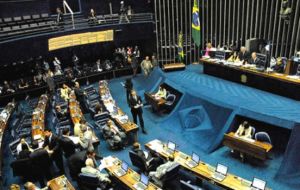MercoPress. South Atlantic News Agency
Brazilian economy eroding Rousseff’s support, but remains favourite for 2014 election
 Despite majority in Congress, members have overridden some vetoes in major legislation
Despite majority in Congress, members have overridden some vetoes in major legislation Brazilian President Dilma Rousseff's approval rating fell for the first time since her term began in January 2011 as concern about inflation and sluggish economic growth grew. Rousseff's presidency was rated as “good” or “excellent” fell to 57% from 65% in the previous poll.
The Datafolha survey was published in the Folha de S. Paulo newspaper. The decline was seen in all age and income groups and in all regions of Brazil, Datafolha said.
Rousseff remains the favourite to win presidential elections in October 2014, but according to Datafolha her weakening popularity reflects Brazilians' dissatisfaction with the performance of the economy and rising concern that consumer prices and unemployment will rise.
The percentage of Brazilians who expect the inflation rate to rise from current levels rose to 51% from 45%, the poll said.
Inflation rose to 6.5% in the 12 months ended May 30, Brazil's IBGE statistics agency said last week, which means it is now at the top of the government's own inflation targeting range of 4.5% plus or minus two percentage points.
Economic growth in the first quarter came in below expectations, with GDP rising only 0.6% compared with the fourth quarter. Annual GDP growth in 2012 was 1.4%.
The risk of inflation limits the ability of Rousseff to promote the expansionist economic policies that have won her many supporters. It also prompted the central bank to raise interest rates to 8% from 7.5% last week, a move that could hurt already sluggish growth.
Economic difficulties and policy doubts come as Rousseff also faces growing resentment from members of her ruling coalition in Congress.
Despite a strong coalition majority in both houses of Congress, legislators have overridden Rousseff's line item vetoes of a controversial royalty provisions in a major oil law and resisted voting in favour of high-profile legislation written by the executive aimed at improving the country's clogged and inefficient ports.
Despite the declines in popularity, Datafolha said Rousseff remains the favourite among the most likely candidates in an October 2014 presidential election.
According to the Datafolha, she is the favourite of 51% of those polled, followed by Marina Silva, a former Brazilian environment minister with 16% and Aecio Neves, a former governor of Minas Gerais state with 14%. Neves is the leader of Brazil's main opposition party, the PSDB.
The Datafolha poll was conducted on June 6 and 7 and surveyed 3,758 people. The poll has a margin of error of plus or minus two percentage points.




Top Comments
Disclaimer & comment rules-

-

-

Read all commentsThe difficulty for Dilma is simple: her avowed adherence to some perceived ‘new’ economics theory is leading the country into problem areas.
Jun 10th, 2013 - 01:43 pm 0This is not helped by the retention of the liar Mantega as Finance Minister who lost all of whatever credence he had when he lied to the international investment community last year and caused financial losses for those who took his word.
Liars in Argentina’s government are to be expected but I would have thought the rest of SA could see for themselves where that got them: nowhere.
It is to be hoped that Dilma does not start panicking over her fall in favour and messes with other areas of the economy in order to ‘shore up’ her support: polls and elections are two different animals.
I was hoping that Marina Silva had more support than 16%.
Jun 10th, 2013 - 03:23 pm 0Dilma´s policies of free market economy with social inclusion will win her the next election, it´s normal to have a drop in support especially a year before the elections but when the time comes the people will vote for stability & not for the unknown!!!
Jun 11th, 2013 - 01:09 pm 0Commenting for this story is now closed.
If you have a Facebook account, become a fan and comment on our Facebook Page!